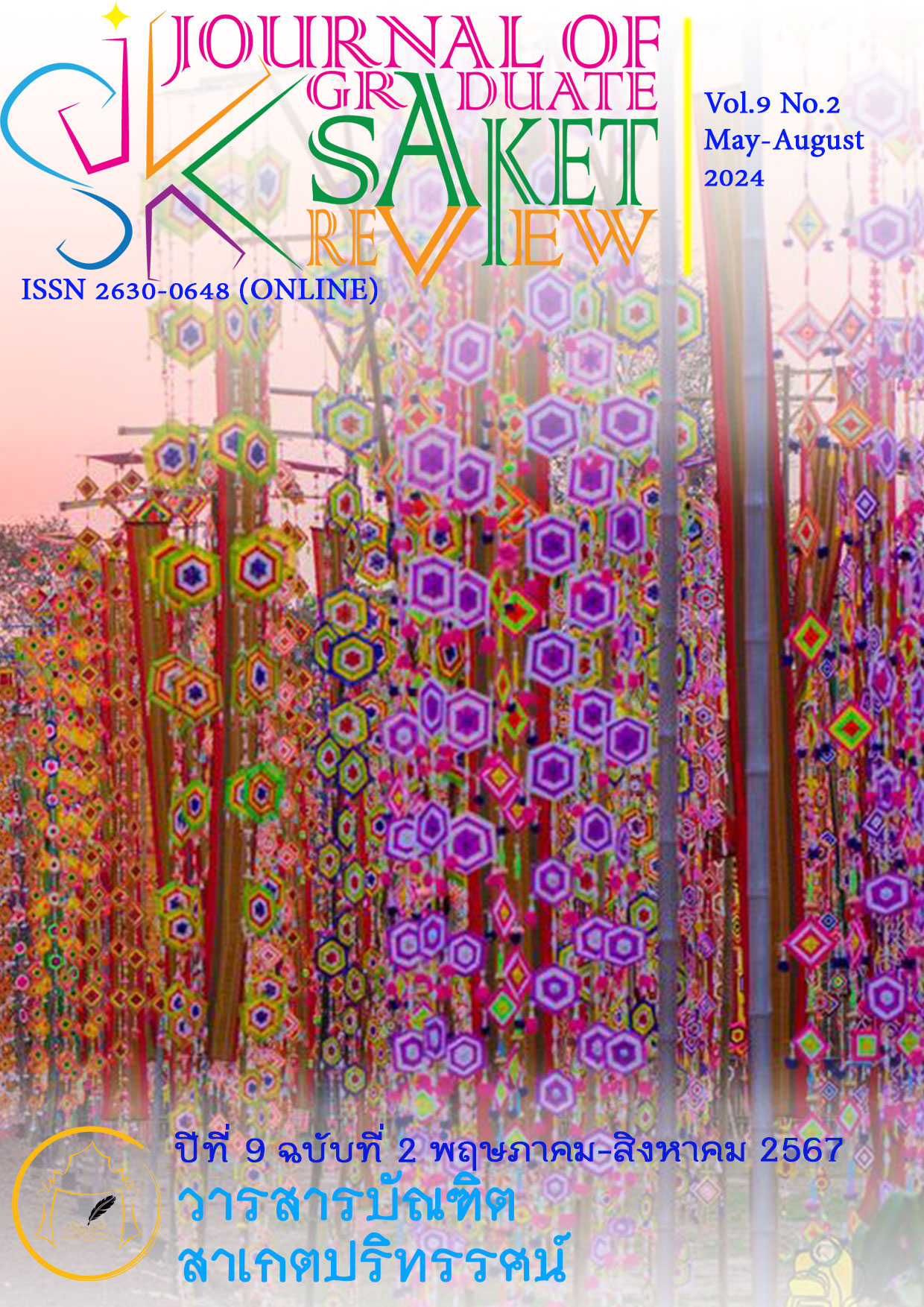การประยุกต์ใช้หลักอปริหานิยธรรมกับการมีส่วนร่วมของชุมชน ตำบลวัดหลวง อำเภอโพนพิสัย จังหวัดหนองคาย
Main Article Content
บทคัดย่อ
บทความวิจัยนี้มีวัตถุประสงค์ 1) เพื่อศึกษาหลักอปริหานิยธรรมในพุทธศาสนาเถรวาท 2) เพื่อศึกษาการมีส่วนร่วมของชุมชนตำบลวัดหลวง อำเภอโพนพิสัย จังหวัดหนองคาย 3) เพื่อประยุกต์ใช้หลักอปริหานิยธรรมกับการมีส่วนร่วมของชุมชนตำบลวัดหลวง อำเภอโพนพิสัย จังหวัดหนองคาย เป็นการวิจัยเชิงคุณภาพ โดยการสัมภาษณ์เชิงลึก กลุ่มผู้ให้ข้อมูลหลัก จำนวน 25 รูป/คน วิเคราะห์ข้อมูลด้วยวิธีการพรรณนา
ผลการวิจัยพบว่า
หลักอปริหานิยธรรม เป็นหลักธรรมอันเป็นที่ตั้งแห่งความไม่เสื่อม เป็นไปเพื่อความเจริญ ดังนี้ 1) หมั่นประชุมกันเนืองนิตย์ 2) พร้อมเพรียงกันประชุม พร้อมเพรียงกันเลิกประชุม 3) ไม่ตั้งกฎระเบียบที่ขัดต่อระเบียบเดิม 4) มีความเคารพนับถือต่อผู้บังคับบัญชาตามลำดับชั้น 5) ให้เกียรติและคุ้มครองสิทธิสตรีตามกฎหมายและระเบียบขององค์กร 6) ให้ความเคารพต่อสถานที่ 7) ให้ความดูแลเอาใจใส่ต่อท่านผู้มาเยือน ถือว่าเป็นบุคคลสำคัญ
การมีส่วนร่วมของชุมชนตำบลวัดหลวง อำเภอโพนพิสัย จังหวัดหนองคาย ใน 5 ด้าน คือ 1) การมีส่วนร่วมของชุมชนในการพัฒนาชุมชน 2) การมีส่วนร่วมของชุมชนในการประชุมเพื่อนำเสนอเรื่องต่าง ๆ ที่มีความจำเป็นในการพัฒนาชุมชน 3) การมีส่วนร่วมของชุมชนในการทำกิจกรรมหรือโครงการของชุมชน 4) การมีส่วนร่วมของชุมชนที่ได้รับผลประโยชน์ในกิจกรรมหรือในโครงการพัฒนาชุมชน 5) การมีส่วนร่วมเข้าไปสังเกตการณ์การทำงานของผู้รับจ้างภายนอก และติดตามผลการดำเนินงานโครงการพัฒนาชุมชน
การประยุกต์ใช้หลักอปริหานิยธรรม 5 ด้าน ได้แก่ 1) การมีส่วนร่วมในการพัฒนาชุมชน 2) การมีส่วนร่วมในการตัดสินใจ 3) การมีส่วนร่วมในการดำเนินงาน 4) การมีส่วนร่วมในการรับผลประโยชน์ 5) การมีส่วนร่วมในการประเมินผล โดยไม่ตั้งกฎระเบียบที่ขัดต่อระเบียบเดิม
Article Details

อนุญาตภายใต้เงื่อนไข Creative Commons Attribution-NonCommercial-NoDerivatives 4.0 International License.
เนื้อหาและข้อมูลในบทความที่ลงตีพิมพ์ในวารสารบัณฑิตสาเกตปริทรรศน์ ถือเป็นข้อคิดเห็นและความรับผิดชอบของผู้เขียนบทความโดยตรงซึ่งกองบรรณาธิการวารสาร ไม่จำเป็นต้องเห็นด้วย หรือร่วมรับผิดชอบใด ๆบทความ ข้อมูล เนื้อหา รูปภาพ ฯลฯ ที่ได้รับการตีพิมพ์ในวารสารบัณฑิตสาเกตปริทรรศน์ ถือเป็นลิขสิทธิ์ของวารสารบัณฑิตสาเกตปริทรรศน์ หากบุคคลหรือหน่วยงานใดต้องการนำทั้งหมดหรือส่วนหนึ่งส่วนใดไปเผยแพร่ต่อหรือเพื่อกระทำการใด ๆ จะต้องได้รับอนุญาตเป็นลายลักอักษรจากวารสารบัณฑิตสาเกตปริทรรศน์ ก่อนเท่านั้น
เอกสารอ้างอิง
ภาษาไทย
เขมานันท์ ขบวนฉลาด. (2564). การประยุกต์ใช้หลักอปริหานิยธรรมเพื่อการบริหารจัดการขององค์การบริหาร
ส่วนตำบลประทัดบุ อำเภอปราสาท จังหวัดสุรินทร์. วารสารมหาจุฬาคชสาร. 12(1), 133-142.จำนงค์ อดิวัฒนสิทธิ์ และคณะ. (2532). สังคมวิทยา. กรุงเทพมหานคร: โรงพิมพ์มหาจุฬาลงกรณราชวิทยาลัย.
จรัญ พุษฎีดอน และคณะ. (2567). การประยุกต์ใช้หลักอปริหานิยธรรม 7 ในการมีส่วนร่วมของประชาชนในการจัดทำแผนพัฒนาท้องถิ่น เทศบาลตำบลพรสวรรค์ อำเภอเสลภูมิ จังหวัดร้อยเอ็ด. วารสารรัฐศาสตร์สาส์น มหาวิทยาลัยมหามกุฏราชวิทยาลัย (Online), 3(1), 1 – 14.
เฉลิมพล จินา. (2563). การพัฒนาสังคมแบบมีส่วนร่วม ตามหลักพุทธธรรมของเทศบาลตำบลประตูป่า อำเภอเมืองลำพูน จังหวัดลำพูล. วิทยานิพนธ์พุทธศาสตรมหาบัณฑิต สาขาวิชาการพัฒนาสังคม. บัณฑิตวิทยาลัย: มหาวิทยาลัยมหาจุฬาลงกรณราชวิทยาลัย.
นิรันดร์ จงวุฒิเวศน์. (2550). แนวคิดแนวทางการพัฒนาชุมชน. กรุงเทพมหานคร: กรมการพัฒนาชุมชน กระทรวงมหาดไทย.
ปัญญา เฉลียวชาติ. (2560). การมีส่วนร่วมของประชาชนในการวางแผนพัฒนาตำบลขององค์การบริหารส่วน
ตำบลนครสวรรค์ออก อำเภอเมืองนครสวรรค์ จังหวัดนครสวรรค์. วิทยานิพนธ์ศิลปศาสตรมหาบัณฑิต สาขาวิชากาบริหารเพื่อพัฒนาท้องถิ่น. บัณฑิตวิทยาลัย: มหาวิทยาลัยราชภัฏนครสวรรค์.
พระมหาสุรสิทธิ์ ไชยสังกา และคณะ. (2567). การประยุกต์ใช้หลักอปริหานิยธรรม 7 ที่ส่งผลต่อการมีส่วนร่วม
ทางการเมืองของประชาชนในจังหวัดมหาสารคาม. วารสารมณีเชษฐาราม วัดจอมมณี. 7(3), 53-82.
พระมหาประกาศิต สิริเมโธ (ฐิติปสิทธิกร). (2556). การมีส่วนร่วมของประชาชนในการพัฒนาหมู่บ้านเศรษฐกิจ
พอเพียง ของชุมชนบ้านคลองใหม่ อำเภอสามพราน จังหวัดนครปฐม. วิทยานิพนธ์พุทธศาสตรมหาบัณฑิต สาขาวิชาการพัฒนาสังคม. บัณฑิตวิทยาลัย: มหาวิทยาลัยมหาจุฬาลงกรณราชวิทยาลัย.
พระมหาฬี เป็ญ. (2566). “การประยุกต์หลักอปริหานิยธรรมเพื่อส่งเสริมการมีส่วนร่วมทางการเมืองของประชาชน จังหวัดลพบุรี”. วารสารสหวิทยาการนวัตกรรมปริทรรศน์. 6(6), 226-239.
มหาจุฬาลงกรณราชวิทยาลัย. (2539). พระไตรปิฎกภาษาไทย ฉบับมหาจุฬาลงกรณราชวิทยาลัย. กรุงเทพมหานคร: โรงพิมพ์มหาจุฬาลงกรณราชวิทยาลัย.
ภาษาอังกฤษ
Adiwatthanasit J., et al. (1989). Sociology. Bangkok: Mahachulalongkornrajavidyalaya University Printing House.
Chongwutthiwet N. (2007). Community Development Concept. Bangkok: Community Development Department, Ministry of Interior.
Cheliowchat P. (2017). Public Participation in Sub-district Development Planning of the Sub-district Administrative Organization, Nakhon Sawan Ok Sub-district, Mueang Nakhon Sawan District, Nakhon Sawan Province. Master of Arts Thesis in Local Administration for Development. Graduate School: Nakhon Sawan Rajabhat University.
Jina C. (2020). Participatory Social Development According to the Buddhist Principles of Pratu Pa Subdistrict Municipality, Mueang Lamphun District, Lamphun Province. Master of Buddhist Studies Thesis, Major in Social Development. Graduate School: Mahachulalongkornrajavidyalaya University.
Khunchalat K. (2021). Application of the Principle of Non-Irrational Dharma for the Management of the Administrative Organization, Bu Subdistrict, Prasat District, Surin Province. Journal of Mahachulalongkornrajavidyalaya University. 12(1), 133-142.
Mahachulalongkornrajavidyalaya University. (1996). Thai Tripitaka, Mahachulalongkornraja vidyalaya Edition. Bangkok: Mahachulalongkornrajavidyalaya University Printing House.
Phusadeedon C., et al. (2024). Application of the Principle of Non-Irrational Dharma 7 in Public Participation in the Preparation of Local Development Plans, Phonsawan Subdistrict Municipality, Selaphum District, Roi Et Province. Journal of Political Science, Mahamakut Buddhist University (Online). 3(1), 1-14.
Phra Maha Surasit Chaisangka et al. (2024). Application of the 7 Aparihaniyadhamma Principles Affecting Political Participation of People in Maha Sarakham Province. Journal of Mani Chettharam, Wat Chommani. 7(3), 53-82.
Phra Maha Prakasit Sirimetho (Thitipasitkorn). (2013). Public Participation in the Development of the Sufficiency Economy Village of Ban Khlong Mai Community, Sam Phran District, Nakhon Pathom Province. Master of Buddhist Studies Thesis in Social Development. Graduate School: Mahachulalongkornrajavidyalaya University.
Phra Mahalee Pen. (2023). Application of the Principle of Aparihaniyadhamma to Promote Political Participation of People in Lopburi Province. Journal of Interdisciplinary Innovation Review. 6(6), 226-239.


